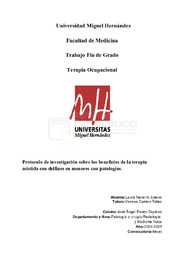Por favor, use este identificador para citar o enlazar este ítem:
https://hdl.handle.net/11000/38276Registro completo de metadatos
| Campo DC | Valor | Lengua/Idioma |
|---|---|---|
| dc.contributor.advisor | Carrión Téllez, Vanesa | - |
| dc.contributor.advisor | Pastor Zaplana, José Ángel | - |
| dc.contributor.author | Navarro Esteve, Laura | - |
| dc.contributor.other | Departamentos de la UMH::Patología y Cirugía | es_ES |
| dc.contributor.other | Departamentos de la UMH::Patología y Cirugía | es_ES |
| dc.date.accessioned | 2025-11-17T16:00:15Z | - |
| dc.date.available | 2025-11-17T16:00:15Z | - |
| dc.date.created | 2025-05-01 | - |
| dc.identifier.uri | https://hdl.handle.net/11000/38276 | - |
| dc.description.abstract | La Terapia Asistida con Delfines (TAD) se considera una intervención complementaria orientada al abordaje terapéutico que brinda beneficios significativos a los niños y adolescentes entre 4 y 17 años que presentan condiciones del neurodesarrollo, como el síndrome de down, parálisis cerebral, trastorno del espectro autista y diferentes trastornos. La TAD, al desarrollarse en un entorno acuático y con la participación del animal, en este caso el delfín, busca favorecer las habilidades emocionales, cognitivas y motoras de los niños, así como el bienestar ocupacional de los cuidadores. El diseño del protocolo se trata de un estudio cuasi-experimental con grupo experimental, donde se llevará a cabo un reclutamiento de 30 menores. Una vez seleccionados, a los tutores legales se les proporcionará diferentes escalas: Escala de Zarit y la Escala HAD, además de un cuestionario. Por último, se realizará un análisis de todos los datos obtenidos y se interpretarán los resultados. El protocolo tendrá una duración de 8 meses, desde la primera fase que consta reclutamiento y definición de muestras hasta la última fase de analizar los datos, y se necesitará un presupuesto de 33.453,50€. | es_ES |
| dc.description.abstract | Dolphin- Assisted Therapy (DAT) is considered a complementary intervention aimed at therapeutic support, offering significant benefits to children and adolescents aged 4 to 17 who present with neurodevelopmental conditions such as Down Syndrome, cerebral palsy, autism spectrum disorder, and various other disorders. The DAT, conducted in an aquatic environment and involving the interaction with dolphins, aims to promote the emotional,cognitive and motor skills of children, as well as to enhance the occupational wellbeing of their caregivers. The study follows a quasi-experimental design with an experimental group, involving the recruitment of 30 children. Once participants are selected, their legal guardian will be provided with various assessment tools, including the Zarit Burden Interview and the Hospital Anxiety and Depression Scale, in addition to a questionnaire. A comprehensive analysis of all collected data will subsequently be carried out and the results interpreted. The full protocol will span eight months, from the initial recruitment and sample definition phase to the final data analysis stage. A budget of 33,453.50€ will be required to implement the study. | es_ES |
| dc.format | application/pdf | es_ES |
| dc.format.extent | 35 | es_ES |
| dc.language.iso | spa | es_ES |
| dc.publisher | Universidad Miguel Hernández | es_ES |
| dc.rights | info:eu-repo/semantics/openAccess | es_ES |
| dc.rights | Attribution-NonCommercial-NoDerivatives 4.0 Internacional | * |
| dc.rights.uri | http://creativecommons.org/licenses/by-nc-nd/4.0/ | * |
| dc.subject | Terapia asistida con delfines | es_ES |
| dc.subject | menores | es_ES |
| dc.subject | patologías | es_ES |
| dc.subject | bienestar ocupacional | es_ES |
| dc.subject | protocolo | es_ES |
| dc.subject.other | CDU::6 - Ciencias aplicadas | es_ES |
| dc.title | Protocolo de investigación sobre los beneficios de la terapia asistida con delfines en menores con patologías. | es_ES |
| dc.type | info:eu-repo/semantics/bachelorThesis | es_ES |

Ver/Abrir:
TFG.LauraNavarro.pdf
695 kB
Adobe PDF
Compartir:
 La licencia se describe como: Atribución-NonComercial-NoDerivada 4.0 Internacional.
La licencia se describe como: Atribución-NonComercial-NoDerivada 4.0 Internacional.
.png)